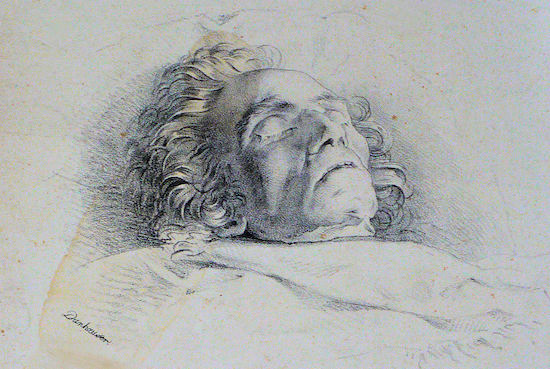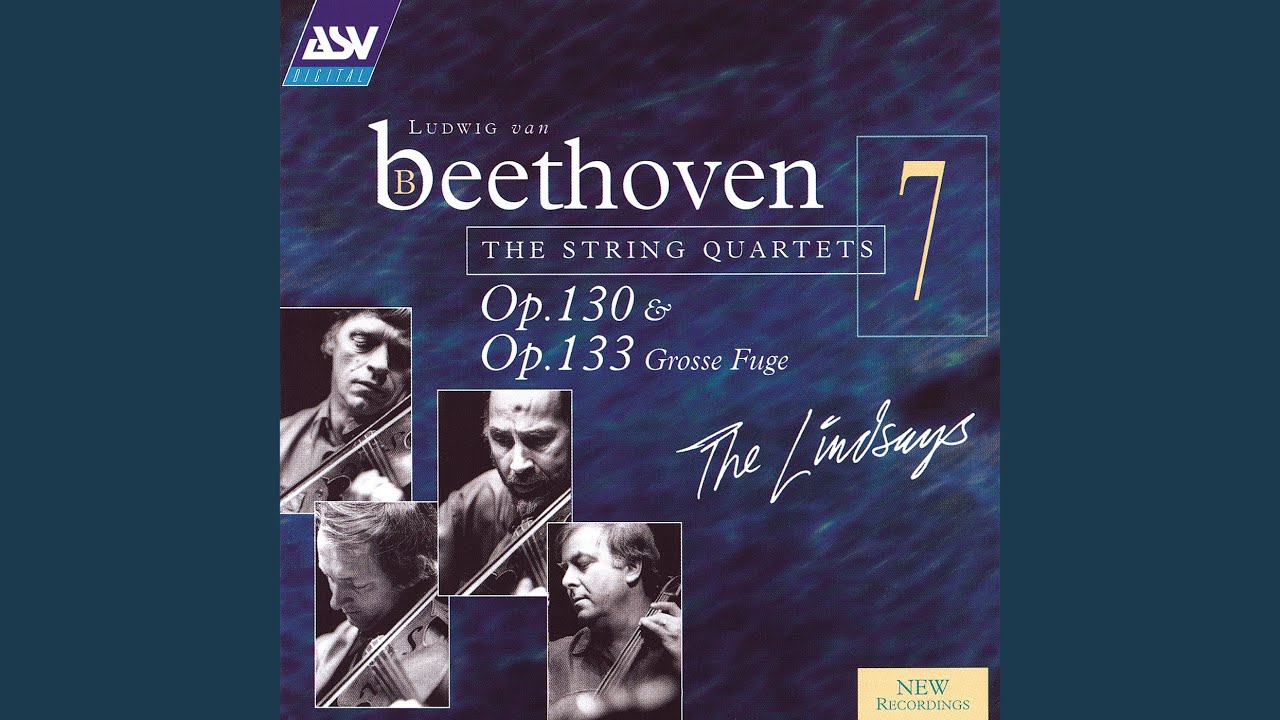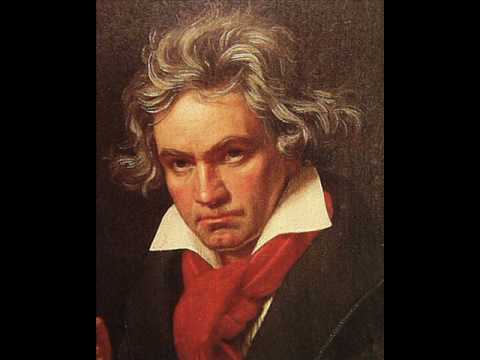In 1826, a year before he died, Beethoven did something so unfathomable that it ranks as one of the greatest mysteries in his story: he made a compromise. His publisher, concerned by the response to the final movement of a new work that had premiered in March, the String Quartet No. 13, asked Beethoven if he’d consider coming up with an alternative ending and publishing the original, Grosse Fuge, as a separate work. Beethoven, normally so inflexible, agreed. The replacement, completed in November, was the last piece of music he ever wrote.
At the premiere, the Grosse Fuge [Great Fugue] had baffled critics and the audience alike. The other five movements of the quartet were praised – two of them were given encores – but the epic, 15-minute closer was dismissed out of hand. A reviewer for the leading German-language musical periodical of the day, Allgemeine musikalische Zeitung, called it “incomprehensible, like Chinese” and “a confusion of Babel”.
Beethoven, stone deaf and in poor health, hadn’t attended the concert – he was in the pub. But he heard what happened from Karl Holz, second violinist in the group that had premiered the piece. “And why didn’t they encore the fugue?” he asked. “That alone should have been repeated! Cattle! Asses!” He stood by the quality of the work, so why did he buckle and agree to compose an alternative ending? We do not know.
Never wealthy, although he was famous, it’s been speculated that Beethoven was seduced by the possibility of doubling his money by publishing the piece separately, or perhaps – and this isn’t inconceivable – he might have foreseen exactly what happened with the Grosse Fuge. Brutally severed from the string quartet it was intended to conclude, it floated off alone through time and space as its own cosmic entity, taunting music for decades to come; a number one digit too big for all brains but Beethoven’s to grasp. Performances were so rare that in 1889 Grove’s Dictionary Of Music said, “One has no means of judging it, as it is never played,” and, in fact, it took until after the Second World War for it to become routinely stitched back onto the String Quartet No. 13, by which time musicians had become technically gifted enough to not make a total hash of performing it. These days you might hear either ending, or both, taking a full performance of up to an intimidating hour in length.
A fugue is when two or more relatively isolated melodies sound together in a piece, interweaved. They can be followed independently, but together they form harmony – counterpoint. Bach, a magician of music, was a master of the form and his fugues sound richly satisfying on the ear. After him, Mozart wrote a few, and then the fugue fell largely out of favour until Beethoven decided to take the technique to breaking point in the last decade of his life. “In my student days I wrote dozens of fugues,” he said. “But the fancy also wishes to exert its privileges and today a new and really practical element must be introduced into the old and traditional forms.”
To Beethoven, the composition of fugues had become “the art of making musical skeletons” and what’s new in his Grosse Fuge, which is actually a double fugue, is that he uses dissonant notes, fiercely angular rhythms and savage, dramatic shifts in mood – all to such original effect that you could argue it’s not a fugue at all but an entirely unique method of writing music that’s “somewhat free, somewhat scholarly”, as he said. It starts reasonably enough with a few slashes on the strings and the introduction of a melody line – standard fare for a string quartet – and then it’s like he’s suddenly behind the wheel of a lorry with 18 gears. He rams the gearstick into 18th and bombs down the motorway, flattening chickens, children, cars, until he smashes into a bridge five minutes later and comes to, out of his mind, but with enough of his mental powers left to pick up the scraps of his melody lines, glue them back together and, bam, he’s off again – for another 10 minutes of absolute agony or pure ecstasy, depending on your threshold for pain. And he doesn’t really conclude the piece in any clean or gratifying way, as Bach would have done. “Having pushed music as far as he could, to the farthest reaches of his own extraordinary invention,” wrote music journalist Peter Gutmann, “Beethoven simply leaves us with his materials, shrugs and walks off, daring us to expand music yet further into realms where not even he was prepared to venture.”
In 1979, the American critic Joseph Kerman said that the Grosse Fuge “stands out as the most problematic single work in Beethoven’s output and… doubtless in the entire literature of music”. Beethoven never heard it – he’d been completely deaf for five years or more before he wrote it – but if you think, as many people did at the time, that it was the creation of man who could only be deaf, and was also probably mad, you need to listen to the movement that precedes the fugue in his String Quartet No. 13, ‘Cavatina’, which means a simple song or melody, and one without a second part or a repeat. Quite the opposite of the Grosse Fuge, Beethoven’s ‘Cavatina’ is intimate and fragile, and, on the album pictured at the top of this page – a brilliant 1980 recording by the Lindsay String Quartet – it’s stretched out for almost two minutes more than most groups dare, revealing every last drop of emotion within it. This music isn’t just beautiful, it’s crushing, as is the story – told by Karl Holz – of how Beethoven wept when he read through the score. The most devastating passage (from 5:10 in the below YouTube) is marked ‘beklemmt’ (‘heavy at the heart’ or ‘oppressed’), at which point the music collapses to almost nothing; it becomes threadbare, pathetic and supernaturally moving.
Beethoven’s ‘Cavatina’, performed by a different group – the Budapest String Quartet – is the final piece on the Voyager Golden Record, and you might well wonder what on earth was going on in Beethoven’s life when he jammed these two wildly incongruous pieces of music together on the end of a string quartet, which traditionally is four movements long and not six. I’ll try to explain in a second, but first let’s take a step back and get a sense of who Beethoven is in music history and why he was such a revolutionary figure. For that, let me pass you over to an old friend of this column – former New York Times critic Harold C. Schonberg – whose lovely book The Lives Of The Great Composers I quote from often.
“The difference between Beethoven and all other musicians before him – aside from things like genius and unparalleled force – was that Beethoven looked upon himself as an artist, and he stood up for his rights as an artist,” Schonberg writes. “Where Mozart moved in the periphery of the aristocratic world, anxiously knocking but never really admitted, Beethoven, who was only about 15 years Mozart’s junior, kicked open the doors, stormed in, and made himself at home. He was an artist, a creator, and as such superior in his own mind to kings and nobles. Beethoven had decidedly revolutionary notions about society, and Romantic notions about music. ‘What is my heart must come out and so I write it down,’ he told his pupil Carl Czerny. Mozart would never have said a thing like this, nor Haydn, nor Bach. The word ‘artist’ never occurs in Mozart’s letters. He and the composers before him were skilled at their craft; they supplied a commodity, and the notion of ‘art’ or writing for posterity did not enter into their thinking. But Beethoven’s letters and observations are full of words like ‘art’, ‘artist’, and ‘artistry’. He was a special breed and he knew it. He also knew he was writing for eternity.”
And regarding Beethoven’s deafness, and how he managed to continue composing when he couldn’t hear, Schonberg says: “Any good musician, or even a talented non-professional, for that matter, can pick up a score, ‘hearing’ everything that goes on… To many non-musicians, this ability is on the order of black magic, but professionals take it as a matter of course. Thus Beethoven, with his incredible musical mind, would have had no trouble, no more than Bach or Mozart had, writing music guided only by the sounds in his inner ear.”
It’s often said of Beethoven’s legacy that he pushed away the composers who came after him; that, because he took music as it was then to such extremes, the next generation were forced to reinvent the wheel and come up with a whole new style. That’s partially true. What you might call his heroic pieces (most of the symphonies, his late string quartets, some of his late piano sonatas) were indeed a kind of musical cul-de-sac, but plenty of other, more melodic Beethoven works (his earlier piano sonatas, songs, bagatelles) are clearly echoed in the Romantic composers that came next (Mendelssohn, Chopin, Schumann, Brahms). Also, it just took longer for the heroic works to bear new fruit – they were that far ahead of their time. It’s uncanny listening to the late piano sonatas today, because in them you can hear the seeds of ragtime and jazz, and the Grosse Fuge came down from orbit, too, influencing the atonal sounds of Arnold Schonberg and Igor Stravinsky in the early 20th century.
Plenty of people will forever think of the Grosse Fuge as being problematic music. The American composer Daniel Gregory Mason, who wrote a book on Beethoven’s string quartets in 1947, called it, “Long, complicated and through many hearings repellent if not unintelligible.” The musicologist Hugo Leichtentritt said it was “impersonal, hostile objectivity”. Schoenberg, however, saw it as a premonition (“Your cradle was Beethoven’s Grosse Fuge,” the artist Oskar Kokoschka wrote to him in a letter) and others went further in their praise. The maverick Canadian pianist Glenn Gould, who I covered in a previous column said, “For me, the Grosse Fuge is not only the greatest work Beethoven ever wrote but just about the most astonishing piece in musical literature.” In the 1960s, when he was in his 80s, Stravinsky called it “an absolutely contemporary piece of music that will be contemporary forever”, adding: “Hardly birthmarked by its age, the Great Fugue is as rhythm alone more subtle than any music composed in my own century… It is pure interval music, this fugue, and I love it beyond any other.”

In the 2009 documentary In Search Of Beethoven, the historian Nicolas Marston says: “The musical structures he creates are extraordinarily complex. He’s able to express, or exert, in his music the kind of control over detail that clearly escaped him in daily life altogether.” And make no mistake – Beethoven’s private life was a disaster. Not only was he famously bad with women – prone to falling in love with other men’s wives or aristocrats, with whom he stood no chance (psychologists have naturally had a field day over that) – he could also be paranoid and barbaric, especially after he lost his hearing. Forced to communicate with conversation books and with his health declining (he endured terrible sicknesses throughout the last ten years of his life), he became disconnected from reality, and obsessed with morality and “religious feeling”, which he hoped to instil in the listeners of his late works, and those around him.
If Beethoven was capable of writing music as ruthless as the Grosse Fuge, imagine what it was like living with him. No woman ever did, but he adopted his nephew Karl after his brother died in 1812, going to court on multiple occasions to win custody from his sister-in-law, Johanna, whom he thought was “an extremely depraved person” and “a queen of the night” – a prostitute. (She’s certainly a fascinating character; she served time for embezzlement and, after she lost Karl, had an illegitimate daughter.)
Beethoven doted on Karl, but he bullied him to such an extent that he attempted suicide on 31 July 1826 by shooting himself in the head, and I think the incident haunts the Grosse Fuge – premiered just three months earlier. It reveals something about Beethoven’s personality that’s uncomfortable to address. What sort of a man could drive someone he loves to suicide? And, actually, what is Beethoven saying in the replacement finale to his String Quartet No. 13 – a lighter, even jolly piece that became his swansong? Appalled that his behaviour had brought on Armageddon, was he finding an equilibrium within himself here – something perfectly in-between the appalling suffering you hear in the ‘Cavatina’ and the anarchy of the Grosse Fuge? His attitude towards Karl changed immediately – he listened to him for perhaps the first time and allowed him to join the army, as he’d wished. But everyone noticed that Karl didn’t attend Beethoven’s funeral in March the following year, and also that 20,000 other people did.




